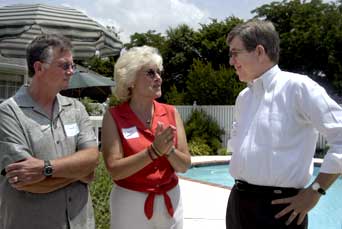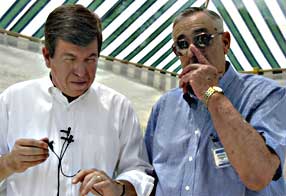
Tricia Orr appeals to her Congressman Roy Blunt, at right, to assist in eliminating the odor problem in Carthage. Her husband David, at left, supports her arguments.
...Well, the barbecue yesterday afternoon was interesting...people from Carthage, the town to the northwest of Joplin, are complaining because they let in a fat-rendering plant and now it stinks so badly in town that they have to stay indoors with the windows shut...that's when the wind is blowing towards them and the plant's production schedule is backed up leaving trucks loaded to the brim with animal parts in the hot sun before processing their contents. Tricia Orr of Carthage hosted the get together at her home at 13416 Jasmine Loop. Her intent was to bring together some townsfolk and government officials to light a fire under some hot dogs and baked beans as well as the odor issue involving Renewable Environmental Solutions.
Rep. Roy D. Blunt was there. His team supplied the hot dogs. The Orrs supplied the rest.
"You will have your life back" was a promise made by the representative from RES who visited us, Orr said. But a lawsuit begun by the City of Carthage and Attorney General Jay Nixon of Missouri was necessary to force RES plant officials to install updated scrubbers and thermal oxidizers to the system that theoretically would remove the offensive odor. Kenneth Johnson, mayor of Carthage, said he was told they were functioning now.

Rep. Blunt, at left, readies himself for a TV interview. Alongside him is Carthage Mayor Kenneth Johnson.
Dale Lacy, a neighbor commented that the smell was awful last Thursday, the day before graduation ceremonies, but miraculously was absent the next day. How the odor affects their neighborhood, Overlook Estates, a growing development of upscale homes northeast of the plant, depends upon the direction of the wind, Lacy pointed out. "We are most vulnerable when the wind is coming from the south-southwest," he said.
This afternoon the odor was pleasantly absent. That made the argument more difficult to present to Blunt who confessed that he had not had an opportunity to smell it.
DNR representative admits problems
Camille Dobler, an environmental specialist for the Missouri Department of Natural Resources, admitted that her Neosho office received so many complaints about the odor problem that they were spending four to six hours a day dealing with them. The DNR was part of the air permit process which mandated that RES would keep the animal parts to be rendered covered, but Dobler said that has not been followed.
"The material can sit in uncovered trucks for an extended period of time," she said. "That may work in winter, but it's not going to be possible in the summer. Also, the material is fed from the containers to the scrubbers. During the time the material is in the system before hitting the scrubbers, it has odor problems."
Arthur Bruce, a retired funeral director, thinks that when the plant operates with a small volume of material, the odor doesn't reach their neighborhood. But the plant still stinks. He told of meeting a laundry delivery man who picked up uniforms from the plant. He told his boss that he wouldn't enter the plant due to the smells that invade his clothes. Bruce's suggestion was that the plant should be in the "boondocks somewhere."
When Orr was asked whether she or her neighbors were informed of the city's decision to issue a building permit for the plant, Orr replied, I can't think of a single neighbor who knew about it." She said the city doesn't have a website that announces agendas for its government meetings.
Orr also questioned whether the process will ever be profitable. Hearing that not only was RES processing neighboring ConAgra manufacturing by-products but that trucks were bringing by-products from facilities as far away as Wichita, Orr asked, "With gas so high, how can they truck so far?" "That's contradictory."
Blunt admitted that he was not here to monitor the plant's progress but because he said he would be here. He called the plant "an experimental facility" and that its "technology makes lots of sense for the country." He called getting rid of biomass "a challenge." He told everyone that he strongly sanctions turning waste into something of value. He said he was proud that the energy-producing technology happened first in Missouri.
"We are way too dependent on fuels from somewhere else," he said. "We need alternative energy sources to meet our needs."
Not satisfied with Blunt's rationalizations, Orr asked, "Who is the final one to say it's working?"
"I don't know for sure," was Blunt's reply, "but not everyone in the community will be satisfied."
For background data, click on the links below.
Agricultural waste processed into oil
Attorney General, City of Carthage file suit
"Reek and rereek: RES cited again (Redden, "Globe," 6/1-/05)






Comments